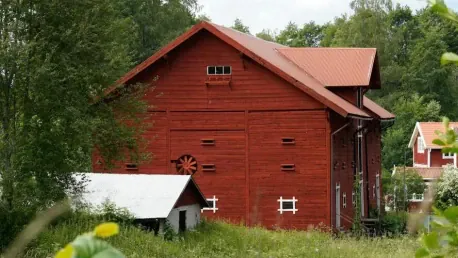The advances in artificial intelligence (AI) are not exclusive to sectors like finance, healthcare, or retail. The agricultural and forestry sectors are also witnessing significant transformations thanks to AI. The Brazilian SaaS startup BemAgro is at the forefront of this revolution, with a clear mission to optimize forest management through AI and other cutting-edge technologies. The recent $2.6 million pre-Series A funding round marks a crucial milestone for BemAgro, enabling it to scale its operations and enter new markets.
From Farmlands to Forests: A Strategic Shift
BemAgro initially made its mark by using AI and computer vision to enhance traditional farming practices. These technologies have proven effective in managing crops like corn, soybeans, cotton, and sugarcane, improving productivity and reducing costs. The recent strategic shift towards forest management leverages BemAgro’s existing technologies, making it a natural progression. The similarities in managing long-cycle crops and forests provide a seamless transition, enabling BemAgro to repurpose its AI frameworks effectively.
The foray into forest management is not just an opportunistic move but a well-thought-out strategy. The forestry sector, like agriculture, faces numerous challenges, including labor shortages, high operational costs, and the need for sustainable practices. BemAgro’s AI solutions, trained on extensive agricultural datasets, are well-positioned to address these issues in the forestry sector, particularly in managing forest assets like eucalyptus and peanut trees. By enhancing productivity and reducing operational costs, BemAgro aims to make forest management not only more efficient but also more sustainable.
Leveraging Cutting-Edge AI and Computer Vision
BemAgro’s SaaS platform employs advanced AI and computer vision technologies to collect and analyze data. This data is gathered from various sources such as tractors, drones, and satellite imagery. The platform’s capabilities extend beyond simple data collection; it provides actionable insights that help optimize planting, spraying, and harvesting activities. For instance, the platform can generate variable-rate application maps, detect weeds, and identify plant failures, thereby enabling more precise and efficient forest management.
One of the standout features of BemAgro’s technology is its ability to automate labor-intensive tasks. Current forestry practices often require manual data collection, which is both time-consuming and costly. BemAgro automates these processes, offering more accurate information and quicker response times. This not only reduces labor costs but also significantly enhances operational efficiency, making forest management more sustainable and profitable. By automating and optimizing various processes, the platform allows forest managers to focus more on strategic decisions, improving the overall effectiveness of their operations.
Strategic Investor Partnerships: More Than Just Capital
An integral aspect of BemAgro’s success is its strategic partnerships with investors like CNH Industrial, Suzano Ventures, and ATVOS. These partnerships extend beyond mere financial backing, offering invaluable industry expertise and resources. For instance, Suzano Ventures, linked to one of the world’s largest pulp producers, brings extensive knowledge and infrastructure crucial for BemAgro’s expansion into forest management.
These strategic partnerships are meticulously selected to ensure alignment with BemAgro’s objectives. The collaboration with Suzano Ventures includes a two-year roadmap aimed at developing five new products. This partnership also offers BemAgro access to Suzano’s extensive farmlands and infrastructure, enabling robust AI model training and validation. Such synergies are vital for BemAgro to adapt its agricultural technologies for effective application in forestry. The combination of financial support and industry expertise provides BemAgro with a solid foundation for its future endeavors.
Scaling Up: A Vision for the Future
BemAgro has set ambitious targets for the future, with plans to monitor 10 million hectares of land by 2032. This ambitious goal underscores the potential of AI to revolutionize traditional practices in both agriculture and forestry. The company aims to start with eucalyptus and peanut trees, leveraging the similarities in their management requirements with those of sugarcane. By focusing on initial target areas, BemAgro can fine-tune its technology before expanding further.
Moreover, BemAgro is eyeing an international expansion, targeting North American and European markets by 2026. This global growth strategy reflects the increasing demand for AI-driven solutions in forest management. By offering a scalable, efficient, and cost-effective platform, BemAgro is well-positioned to meet this demand and establish itself as a global leader in the sector. As part of its vision, the company plans to continuously innovate and adapt its technologies, ensuring they remain at the cutting edge of both agriculture and forestry management.
The Broader Implications for Agriculture and Forestry
AI progress is not just confined to finance, healthcare, or retail; it’s making waves in agriculture and forestry too. A prime example is the Brazilian SaaS startup BemAgro, which is leading the charge in transforming forest management with AI and other innovative technologies. Their mission is to make forest management processes more efficient and effective. Recently, BemAgro achieved a significant milestone by securing $2.6 million in a pre-Series A funding round. This critical injection of capital will allow BemAgro to scale its operations, develop its technological offerings further, and expand into new markets. This funding is a testament to the increasing recognition of AI’s potential to bring about positive changes in traditional sectors like agriculture and forestry. With this boost, BemAgro is poised to set a new standard in forest management, making it more sustainable and technologically advanced. The company’s success signals a broader trend where even the most traditional industries embrace digital transformation and technological advancements.









